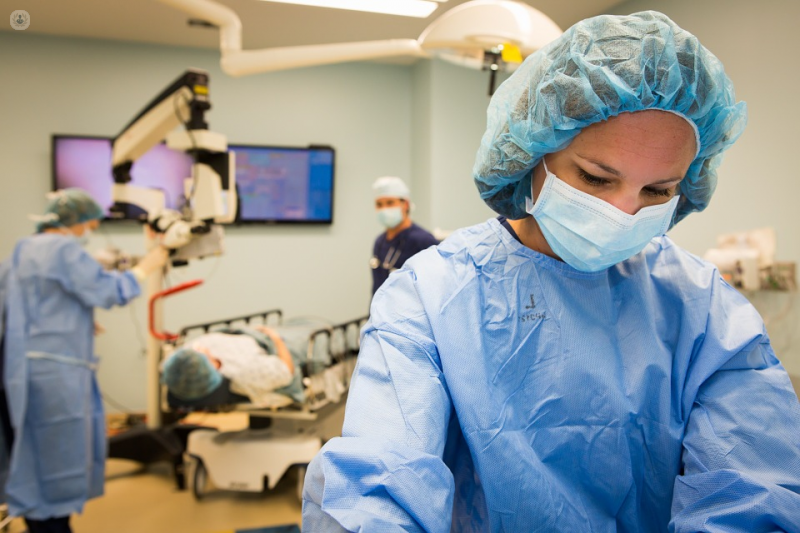

What is endocrine surgery?
Endocrine surgery is used to treat diseases affecting the organs responsible for producing hormones; primarily the thyroid gland, the parathyroid glands and the adrenal glands.
- Thyroid gland: this gland is divided into two lobes connected by an isthmus and is located in the anterior part of the neck, in front of the windpipe.
- Parathyroid glands: located in the neck behind the thyroid gland. These glands secrete hormones which regulates the metabolism of calcium levels in the blood.
- Adrenal glands: located above the kidneys. Responsible for producing adrenaline, corticosteroids, aldosterone and some of the production of the female and male sexual hormones.

Why is it done?
Different types of endocrine surgery exist, depending on which organ is affected and the disease.
With regard to the thyroid gland, a very frequent problem is an increase in its size, called goitre. Surgery may become necessary if the thyroid gland starts to compress neighbouring structures, causing difficulties swallowing, affecting the voice, etc. Other diseases that can affect the thyroid gland are hyperthyroidism (excessive thyroid hormone production), hypothyroidism (reduction or permanent cessation of thyroid hormone production), or thyroid cancer.
With regard to the parathyroid glands, diseases include those related to hyperparathyroidism, including primary hyperparathyroidism, defined as excessive production of PTH causing mobilisation of calcium from the bones to the blood.
Excessive secretion by the adrenal glands can give rise to different diseases, depending on which hormone is excessively secreted; Cushing’s syndrome (excess glucocorticoids), Conn's syndrome (excess aldosterone), virilisation (excess sex steroids produced in women), and others.
What does endocrine surgery involve?
Different operations exist, depending on the patient’s condition and the stage of their disease. In most cases, the affected gland is removed. However, this also depends on the particular pathology affecting the gland, with different surgical procedures for different pathologies.
How to prepare for endocrine surgery:
Before surgery, you will have to undergo basic preoperative tests, which include ECG, chest X-ray, blood testing and other, more complicated investigations depending on the particular surgery to be performed.
Unless the surgeon indicates otherwise, you must be in a fasting state for surgery, not having ingested any foods or liquids in the 8 hours before surgery.
Care following endocrine surgery:
Hygiene must be minimal in the first week, but washing may be done every two days, with application of antiseptic to the operated area. Remove the protective dressing if it becomes unstuck during showering. After the first week, you can start to wash the wound daily, with water and neutral soap.
Food must be maintained at the same level as in hospital, i.e. at least three meals every day. It is important that you remain well hydrated and that you do not follow any diet that could affect your body.
There will only be slight restrictions to mobility; the operated area may be painful or rigid. Rest during the first few days is important, and you will be able to resume activities gradually.
